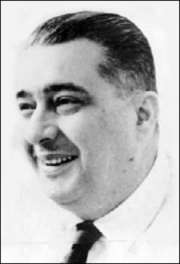|
Biografie José Lezama Lima
José Lezama Lima (19 decembrie, 1910 în Havana, Cuba - 8 august, 1976 în Havana, Cuba) a fost un romancier ți poet cubanez.
Born in the Columbia Military Encampment close to Havana in the city of Marianao where his father was a colonel, Lezama lived through the most turbulent times of Cuba's history, fighting first against the Machado dictatorship, and later surviving the Castro regime. A gay man himself,[1] his literary output includes the semi-autobiographical, baroque novel Paradiso (1966), the story of a young man and his struggles with his mysterious illness, the death of his father, and his developing homosexuality and poetic sensibilities. Lima also edited several anthologies of Cuban poetry and the magazines Verbum and Orígenes, presiding as the patriarch of Cuban letters for most of his later years.
In addition to his poems and novels, Lezama wrote many essays on figures of world literature like Mallarmé, Valéry, Góngora and Rimbaud as well as on Latin American baroque asethetics. Most notably the essays published as La expresión americana lay out his vision of the European baroque, its relation to the classical, and of the American baroque.
José Lezama Lima died in 1976 at age 65 and was buried in the Colon Cemetery, Havana. He was influential to Cuban and Puerto Rican writers of his generation and the next, such as Virgilio Piñera, Reinaldo Arenas, René Marqués, and Giannina Braschi, who depict his life and works in their writing
|




